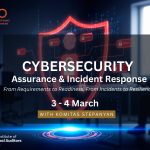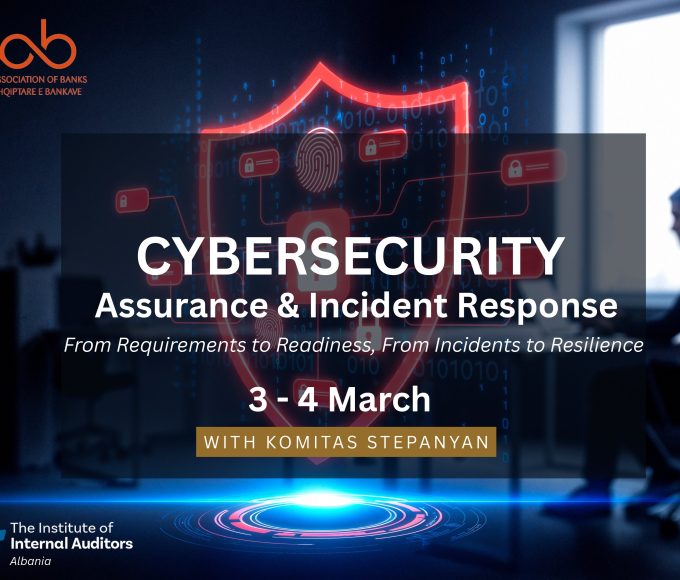
Detection, investigation and countermeasures
Date: 14 – 15 April 2025
Time: 09:00 – 17:00
Location: Xheko Imperial (Foyer meeting room)
Course director: Komitas STEPANYAN

Introduction
“Fraud in Digital Era: Detection, Investigation and Countermeasures” training course is a cutting-edge program designed to arm participants with the essential skills to combat digital fraud in today’s fast-paced technological landscape. This course delves deep into the mechanisms of fraud, exploring why individuals commit fraudulent acts and identifying early warning signs. Participants will gain a thorough understanding of various types of digital fraud, recent trends, and industry-specific case studies that highlight real-world applications. The program emphasizes risk assessment, equipping learners to pinpoint vulnerabilities within their organizations and implement effective countermeasures. By mastering advanced fraud detection techniques such as real-time monitoring, data analysis, behavioral analytics, and AI-based algorithms, attendees will be well-prepared to safeguard their digital assets.
Tailored for a diverse audience, this course is ideal for security professionals, compliance officers, risk managers, IT specialists, auditors, business leaders, and anyone keen on deepening their knowledge of digital fraud prevention and investigation. The curriculum offers practical guidance on conducting thorough fraud investigations, including gathering and preserving digital evidence, understanding legal considerations, and reporting findings. Participants will engage in hands-on exercises and case studies to apply learned concepts in realistic scenarios, ensuring they leave with actionable insights and skills. Whether you are responsible for safeguarding digital assets, ensuring regulatory compliance, or leading organizational fraud prevention efforts, this comprehensive training will enhance your ability to detect, investigate, and counteract digital fraud effectively.
Course Objective
The primary objective of the “Fraud in Digital Era: Detection, Investigation and Countermeasures” course is to equip participants with the knowledge and skills necessary to effectively identify, prevent, and investigate digital fraud in today’s rapidly evolving technological landscape. The course aims to:
✓ Understand fraud fundamentals: Why do people commit fraud, what are some early red flags?
✓ Understand Digital Fraud: Provide a comprehensive understanding of the types of digital fraud, recent trends, and real-world case studies.
✓ Risk Assessment: Enable participants to assess potential fraud risks and vulnerabilities within their organization or industry.
✓ Implement Countermeasures: Teach practical strategies and tools for preventing digital fraud.
✓ Fraud Detection: Introduce advanced fraud detection techniques using real-time monitoring, data analysis, behavioral analytics, and AI-based algorithms.
✓ Investigative Techniques: Offer guidance on conducting thorough fraud investigations, including gathering and preserving digital evidence, legal considerations, and reporting findings.
✓ Hands-On Experience: Provide practical exercises and case studies to apply learned concepts in real-world scenarios, ensuring participants gain actionable insights and skills.
Target Audience
This course is designed for a diverse audience, including:
- Auditors: Internal and external auditors who need to understand digital fraud and its implications for financial reporting and compliance.
- Information Security Professionals: Individuals responsible for safeguarding digital assets and preventing cyber threats within their organization.
- Compliance Officers: Professionals tasked with ensuring adherence to regulatory requirements and mitigating fraud risks.
- Risk Managers: Experts focused on identifying and managing risks within their organization, including financial and operational risks.
- IT Specialists: Technology professionals involved in implementing and managing security solutions to protect against digital fraud.
- Business Leaders: Executives and managers who want to enhance their organization’s fraud prevention and detection capabilities.
- Anyone Interested: Individuals interested in gaining a deeper understanding of digital fraud, its impact, and how to protect against it.
Course Program
Understand Fraud Fundamentals: Why People Commit Fraud and Early Red Flags
- Fraud triangle: Pressure | Opportunity | Rationalization
- Capabilities in Digital Era
- Early Red Flags: Behavioral and Lifestyle Changes | Access and Control Issues | Unusual Transactions
Digital Fraud Landscape: Trends & Emerging Threats
- Traditional vs. digital fraud
- Cyber-enabled vs. cyber-dependent fraud
- Industry-specific fraud trends | Phishing, business email compromise (BEC), loan fraud, Identity fraud, credit application fraud, API security threats, digital wallet fraud, AI-driven scams, SIM swap fraud, call-forwarding fraud, mobile payment fraud.
Fraud Detection Techniques
- Real-time monitoring and data analysis
- Behavioral analytics and adaptive algorithms
- AI/ML for fraud detection
- Identifying suspicious patterns and anomalies
Digital Fraud Investigation: Tools & Techniques
- Digital forensics: Tracing fraudulent transactions
- Steps in conducting a fraud investigation
- Gathering and preserving digital evidence
- Open-source intelligence (OSINT) for fraud investigations
- Legal and ethical considerations
Workshop 2: Fraud Investigation Simulation
Case: A cybercriminal bypassed authentication in a fintech mobile app, transferring funds to offshore accounts. Participants analyze logs, identify red flags, and propose countermeasures.
Fraud Prevention & Risk Management Strategies
- Best practices for banks, fintech, and telecom providers
- Cybersecurity & fraud risk governance
- Identifying potential fraud risks in digital environments
- Assessing vulnerabilities and threatsDeveloping a risk assessment framework
- Role of fraud awareness training for employees and customers
Industry-Specific Case Study Discussion
- Banking: Money laundering via digital accounts (AML perspective)
- Microfinance: Ghost borrowers and fraudulent credit applications
- Fintech: Fraud in decentralized finance (DeFi) and crypto scams
- Telecom: SIM swap attack targeting mobile banking
Reporting and Mitigating Fraud
- Documenting findings and reporting fraud
- Implementing corrective actions and controls
- Continuous improvement and monitoring
Q&A, Summary and key takeaways
Instructor Bio
This training course will be delivered by Komitas Stepanyan, an internationally certified professional and esteemed expert. Mr. Stepanyan is recognized by the International Monetary Fund (IMF) for his exceptional work in financial regulation and supervision, as well as IT and cybersecurity risk management, and IT fraud examination. Additionally, he is a distinguished expert for The World Bank Group, specializing in digital transformation and GovTech activities.
Komitas is the Director of Technology and Cybersecurity Directorate at the Central Bank of ARMENIA. He has 20+ years of experience working as an information security professional, Internal Audit consultant, cybersecurity consultant. More than 10 years he has the head of IT auditing division at the Central Bank of Armenia, providing audit and consulting services including information and cybersecurity audits.
Working as a short-term expert for cyber risk management, regulation and supervision and IT fraud examination for International Monetary Fund, he conducted and led many Technical Assistance and capacity-building missions covering a diverse range of countries and topics in Africa, Asia and Pacific.
Since 2018, he has worked as a short-term consultant for The World Bank, supporting various jurisdictions in digital transformation projects, including cybersecurity.
Komitas holds several international certificates: Certified in Risk and Information Systems Control (CRISC- issued by ISACA) and Certification in Risk Management Assurance (CRMA- issued by IIA), Cobit Foundation Certificate (CobitF – issued by ISACA) and Social Engineering and Phishing Mastery Certificate.
In 2007, he earned his PhD in applied physics. In 2012, he graduated from the “Public Policy and Public Administration” Certificate Program at Tufts University (USA). In 2016, he completed the online course “Digital Money” and in 2017 “Operationalizing Mobile Money” from the Digital Frontiers Institute in partnership with The Fletcher School, Tufts University
Financial Information
Cost per participant: AIIA Members 260 € (total amount, the subject is VAT excluded)
Non-members 300 € (total amount, the subject is VAT excluded)
Price includes course attendance and educational material.
Payment* can be made by bank transfer or direct deposit by using the following account info: Account Holder: Albanian Institute of Internal Auditors Acc.no: 0010039700
Swift: SGSBALTX IBAN: AL43 2021 1123 0000 0000 1003 9700
Raiffeisen Bank Albania
* Important: The transferred amount must include the entire amount as stated above. No shortfalls due to exchange fee/or other administration charges may arise. Albanian Institute of Internal Auditors has to receive the amount that is stated in your invoice.
Postimet e fundit
Related Articles
Webinar: How can technology (GRC, Data lakes, AI) support remote and analytical audit activities?
Remote and analytical auditing is no longer just an option, it’s a...
ByInfo AIIA17 Shkurt, 2026Cybersecurity Assurance & Incident Response
From Requirements to Readiness, From Incidents to Resilience Date: 3 – 4...
ByInfo AIIA16 Shkurt, 2026Auditing Treasury Activity
A Practical Guide to Auditing Liquidity, Market Risk and Treasury Controls Date:...
ByInfo AIIA2 Shkurt, 2026Root Cause Analysis
Tools, Techniques and Tips for Internal Auditors Date: 25 November 2025 (one...
ByInfo AIIA5 Nëntor, 2025









